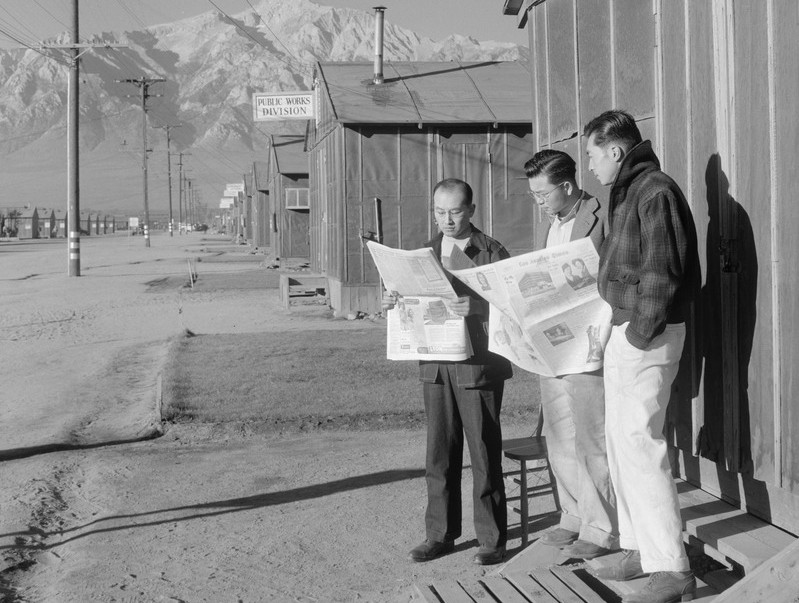October 27, 2025
Educators today face an urgent challenge when it comes to helping students navigate rampant misinformation and disinformation, alongside a broader erosion of public trust in history and journalism. Densho is committed to equipping teachers and students with the tools to evaluate digital sources, recognize bias, and think critically about both past and present information using our rich collection of resources.
In honor of U.S. Media Literacy Week, Densho is highlighting our recent programming on teaching digital literacy. Dig into the resources below, and watch a recording of our recent webinar to hear panelists from Densho and the Southern Poverty Law Center share more on the importance of digital literacy and how we can support students in shaping a more thoughtful and informed future.
What Is Digital Literacy?
The American Library Association defines digital literacy as “the ability to use information and communication technologies to find, evaluate, create, and communicate information.” Whether we are students, teachers, or just someone reading a news article or scrolling on social media, we are inundated with misinformation (information that is false but not necessarily malicious) and disinformation (information shared with malicious intent). Digital literacy provides us with the tools to critically examine that information and identify potential biases, missing perspectives, and false narratives.
As Jon Tobin, Senior Content Developer at the Southern Poverty Law Center, explained during our webinar, “When we’re not being critical consumers of information, it makes it almost impossible for us to be critical producers and communicators of information. Students need all the pieces of digital literacy to ensure that they’re adding thoughtful, factual, truthful information to our discourse.
“It’s so important to have that critical lens around literacy when finding and evaluating information, to be able to take a beat, examine information on a deeper level, and actively take steps to seek out those honest histories.”
Strategies, Tools, and Frameworks for Teaching Digital Literacy
Collections & Research from Densho
Explore oral histories, images, letters, government records, and other primary sources that document the Japanese American experience from immigration in the early 1900s through Redress in the 1980s, with a strong focus on World War II incarceration.
Densho Book Reviews
Use these Densho reviews to find books that accurately and honestly share the history of Japanese American WWII incarceration with children, young adults, and learners of all ages.
Learning For Justice: Digital Literacy Framework and Lesson Plans
Seven key focus areas with accompanying lesson plans for grades K-12, student-facing videos that are engaging and informative, and The Mind Online podcast that dives deep into topics like cognitive bias, social media, and online gaming.
IREX My Mind > My Media Curriculum
Developed by IREX and piloted in Columbia, Missouri public schools, the My Mind over My Media curriculum is another great tool for teaching the ins and outs of digital literacy. It has seven modules that focus on defining media and digital literacy, source evaluation, and using your voice that push students critical thinking.
Retro Report
Short form films and lesson plans to help students apply critical thinking and context to both history and current events. For example, their short film and accompanying lesson plans on race-based propaganda during WWII is a great resource for teaching a more complete history.
Ground News
An aggregator of news articles sorted by topic that shows different biases in how a story is—or isn’t—reported, and helps students see how narratives across ideological spectrums are being shaped and framed.
UNESCO Digital Competence Frameworks for Teachers, Learners and Citizens
UNESCO-UNEVOC provide a global database of digital literacy frameworks, as well as articles, think-pieces, and webinars discussing the skills needed to navigate a changing digital landscape.
Preventing Youth Radicalization: Building Resilient, Inclusive Communities Guide
This resource guide developed by the Southern Poverty Law Center and the Polarization & Extremism Research & Innovation (PERIL) Lab at American University provides community-centered strategies to address the threat of extremism through early prevention and non-carceral solutions.
Watch the Webinar: Teaching Digital Literacy with Densho
View the webinar slides here.
—
[Header: Japanese Americans reading copies of the Manzanar Free Press outside the camp newspaper office in Manzanar concentration camp, 1943. Courtesy of the Library of Congress.]
